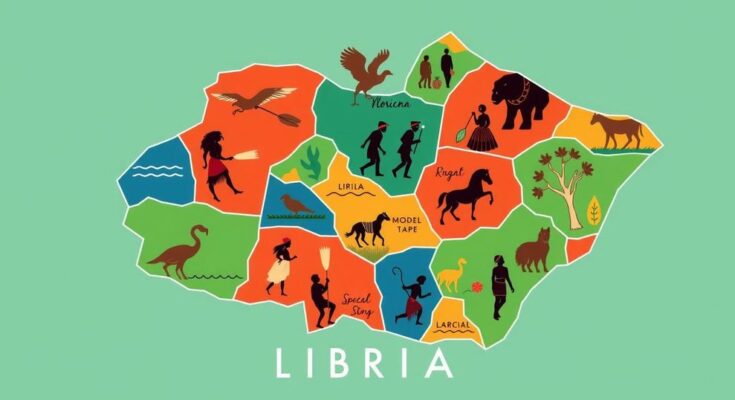Solomon Weawea, Executive Director of LNHCDA, raises concerns over the historical recognition of the Mandingo and Fula tribes, as well as the legacy of Sao Boso Kamara. He questions the lack of official representation for these tribes and their contributions to Liberia’s history. Weawea’s perspective on Kamara as ‘Liberia’s first president’ challenges traditional historical narratives, advocating for a broader acknowledgment of indigenous leaders.
Solomon Weawea, the Executive Director of the Liberia National Heritage and Culture Development Association (LNHCDA), has initiated a significant discourse regarding the historical recognition of the Mandingo and Fula tribes, as well as the legacy of the leader Sao Boso Kamara. He highlighted the political and cultural gaps affecting the acknowledgment of these tribes within Liberia’s framework. Despite Liberia’s composition of 16 tribes, the Mandingo tribe lacks a designated headquarters, and the Fula tribe is not included in the official list of recognized ethnic groups, which raises concerns about their representation.
Weawea has also prompted inquiries into Sao Boso Kamara’s historical narrative, questioning aspects such as his lineage and the reasons behind the absence of documented family ties. Kamara, a key Mandingo leader and cleric from the early 19th century, played a pivotal role in fostering unity among various ethnic groups and facilitating trade prior to American settlers’ arrival. His actions were significant in establishing peaceful interactions between indigenous tribes and settlers.
Moreover, Weawea’s assertion of Kamara as “Liberia’s first president” challenges the widely held belief that Joseph Jenkins Roberts was the inaugural president, thus encouraging historians to reassess the contributions of indigenous leaders in Liberia’s early history. The lack of familial history concerning Kamara raises questions about the integrity of existing historical records.
Weawea’s inquiry extends to the influence of the Mandingo tribe, suggesting it was crucial in Liberia’s early capital. These contemplations underscore the need for a closer examination of the historical roles played by indigenous people in shaping Liberia. Through these queries, Weawea advocates for a renewed exploration of the nation’s history, emphasizing the importance of acknowledging the contributions of marginalized groups.
In his statement, Weawea remarked, “We decoded a missing piece of Liberian history and more,” showcasing the LNHCDA’s commitment to illuminating and preserving Liberia’s diverse cultural heritage.
In conclusion, Solomon Weawea’s inquiries into the historical recognition of the Mandingo and Fula tribes, alongside the legacy of Sao Boso Kamara, challenge long-held narratives of Liberia’s past. By questioning the representation of these tribes and examining Kamara’s role, Weawea advocates for a nuanced understanding of Liberia’s history, urging scholars and citizens alike to acknowledge the contributions of previously overlooked indigenous groups. His efforts to highlight these gaps serve to promote the preservation of Liberia’s rich cultural heritage.
Original Source: frontpageafricaonline.com




